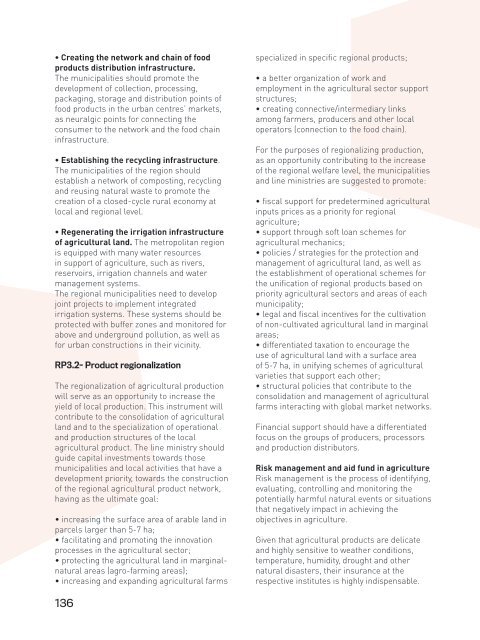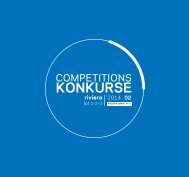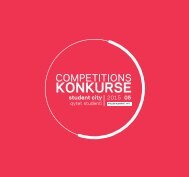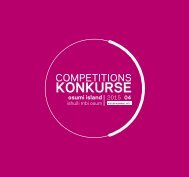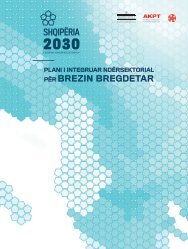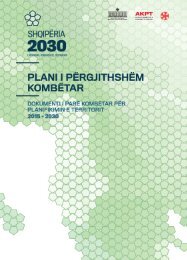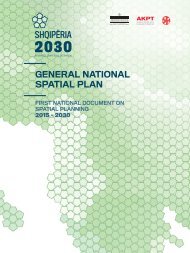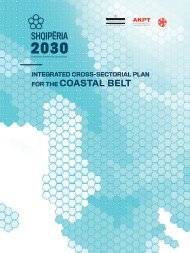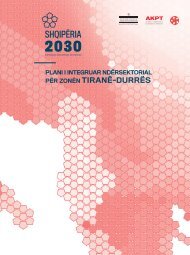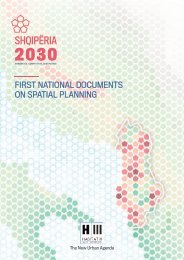Integrated Cross-Sectorial Plan of Tirana-Durres Area
The Albanian Government and the National Spatial Plan have identified the Tiranë-Durrës area, as one of the most important economic areas of the country, and of the Balkan region. To ensure a sustainable territorial and urban development of this area, the Ministry of Urban Development in cooperation with the National Territorial Planning Agency has taken the initiative to draft a Cross-sectoral Integrated Plan for the economic area Tiranë – Durrës. The metropolitan region under study includes territories administered by 5 municipalities: Tiranë, Durrës, Vorë, Shijak, Kamëz.
The Albanian Government and the National Spatial Plan have identified the Tiranë-Durrës area, as one of the most important economic areas of the country, and of the Balkan region. To ensure a sustainable territorial and urban development of this area, the Ministry of Urban Development in cooperation with the National Territorial Planning Agency has taken the initiative to draft a Cross-sectoral Integrated Plan for the economic area Tiranë – Durrës. The metropolitan region under study includes territories administered by 5 municipalities: Tiranë, Durrës, Vorë, Shijak, Kamëz.
You also want an ePaper? Increase the reach of your titles
YUMPU automatically turns print PDFs into web optimized ePapers that Google loves.
• Creating the network and chain <strong>of</strong> food<br />
products distribution infrastructure.<br />
The municipalities should promote the<br />
development <strong>of</strong> collection, processing,<br />
packaging, storage and distribution points <strong>of</strong><br />
food products in the urban centres’ markets,<br />
as neuralgic points for connecting the<br />
consumer to the network and the food chain<br />
infrastructure.<br />
• Establishing the recycling infrastructure.<br />
The municipalities <strong>of</strong> the region should<br />
establish a network <strong>of</strong> composting, recycling<br />
and reusing natural waste to promote the<br />
creation <strong>of</strong> a closed-cycle rural economy at<br />
local and regional level.<br />
• Regenerating the irrigation infrastructure<br />
<strong>of</strong> agricultural land. The metropolitan region<br />
is equipped with many water resources<br />
in support <strong>of</strong> agriculture, such as rivers,<br />
reservoirs, irrigation channels and water<br />
management systems.<br />
The regional municipalities need to develop<br />
joint projects to implement integrated<br />
irrigation systems. These systems should be<br />
protected with buffer zones and monitored for<br />
above and underground pollution, as well as<br />
for urban constructions in their vicinity.<br />
RP3.2- Product regionalization<br />
The regionalization <strong>of</strong> agricultural production<br />
will serve as an opportunity to increase the<br />
yield <strong>of</strong> local production. This instrument will<br />
contribute to the consolidation <strong>of</strong> agricultural<br />
land and to the specialization <strong>of</strong> operational<br />
and production structures <strong>of</strong> the local<br />
agricultural product. The line ministry should<br />
guide capital investments towards those<br />
municipalities and local activities that have a<br />
development priority, towards the construction<br />
<strong>of</strong> the regional agricultural product network,<br />
having as the ultimate goal:<br />
• increasing the surface area <strong>of</strong> arable land in<br />
parcels larger than 5-7 ha;<br />
• facilitating and promoting the innovation<br />
processes in the agricultural sector;<br />
• protecting the agricultural land in marginalnatural<br />
areas (agro-farming areas);<br />
• increasing and expanding agricultural farms<br />
specialized in specific regional products;<br />
• a better organization <strong>of</strong> work and<br />
employment in the agricultural sector support<br />
structures;<br />
• creating connective/intermediary links<br />
among farmers, producers and other local<br />
operators (connection to the food chain).<br />
For the purposes <strong>of</strong> regionalizing production,<br />
as an opportunity contributing to the increase<br />
<strong>of</strong> the regional welfare level, the municipalities<br />
and line ministries are suggested to promote:<br />
• fiscal support for predetermined agricultural<br />
inputs prices as a priority for regional<br />
agriculture;<br />
• support through s<strong>of</strong>t loan schemes for<br />
agricultural mechanics;<br />
• policies / strategies for the protection and<br />
management <strong>of</strong> agricultural land, as well as<br />
the establishment <strong>of</strong> operational schemes for<br />
the unification <strong>of</strong> regional products based on<br />
priority agricultural sectors and areas <strong>of</strong> each<br />
municipality;<br />
• legal and fiscal incentives for the cultivation<br />
<strong>of</strong> non-cultivated agricultural land in marginal<br />
areas;<br />
• differentiated taxation to encourage the<br />
use <strong>of</strong> agricultural land with a surface area<br />
<strong>of</strong> 5-7 ha, in unifying schemes <strong>of</strong> agricultural<br />
varieties that support each other;<br />
• structural policies that contribute to the<br />
consolidation and management <strong>of</strong> agricultural<br />
farms interacting with global market networks.<br />
Financial support should have a differentiated<br />
focus on the groups <strong>of</strong> producers, processors<br />
and production distributors.<br />
Risk management and aid fund in agriculture<br />
Risk management is the process <strong>of</strong> identifying,<br />
evaluating, controlling and monitoring the<br />
potentially harmful natural events or situations<br />
that negatively impact in achieving the<br />
objectives in agriculture.<br />
Given that agricultural products are delicate<br />
and highly sensitive to weather conditions,<br />
temperature, humidity, drought and other<br />
natural disasters, their insurance at the<br />
respective institutes is highly indispensable.<br />
136


